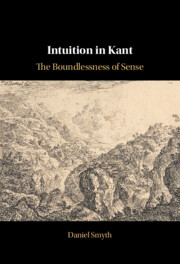Book contents
- Intuition in Kant
- Intuition in Kant
- Copyright page
- Epigraph
- Contents
- Acknowledgments
- Abbreviations, Citations, and Other Conventions
- Introduction
- 1 Reason’s Self-Knowledge and Kant’s Critical Methodology
- 2 Synthetic Judgment and Intuition
- 3 An Apperceptive Approach to the Transcendental Aesthetic
- 4 Exposition, Conceptual Analysis, and Apperception
- 5 Infinity, Discursivity, Givenness
- 6 Prolegomena to a Stufenleiter of Kantian Intuition
- 7 A Stufenleiter of Kantian Intuition, Part I
- 8 A Stufenleiter of Kantian Intuition, Part II
- Bibliography
- Index
3 - An Apperceptive Approach to the Transcendental Aesthetic
Published online by Cambridge University Press: 07 March 2024
- Intuition in Kant
- Intuition in Kant
- Copyright page
- Epigraph
- Contents
- Acknowledgments
- Abbreviations, Citations, and Other Conventions
- Introduction
- 1 Reason’s Self-Knowledge and Kant’s Critical Methodology
- 2 Synthetic Judgment and Intuition
- 3 An Apperceptive Approach to the Transcendental Aesthetic
- 4 Exposition, Conceptual Analysis, and Apperception
- 5 Infinity, Discursivity, Givenness
- 6 Prolegomena to a Stufenleiter of Kantian Intuition
- 7 A Stufenleiter of Kantian Intuition, Part I
- 8 A Stufenleiter of Kantian Intuition, Part II
- Bibliography
- Index
Summary
I reconstruct the preliminary arguments of the Transcendental Aesthetic, which provide the criteria of on which Kant’s central arguments will turn. Kant characterizes intuition as (i) object-giving, (ii) immediate, (iii) affection-dependent representation containing (iv) a matter of sensation that can be distinguished from (v) an a priori form. I explain Kant’s curiously teleological claim that all thought “aims at” intuition in terms of his “baseline conception” of intuition as providing nonintellectual grounds of truth: This is what it means for intuition to be object-giving. I then argue that Kant’s theory of discursive marks entails that object-giving representations must be immediate. Further, the intuition paired with a discursive intellect must be receptive (i.e. affection dependent). These claims can be justified via pure apperception. What cannot be is Kant’s characterization of intuition as sensible. But I show that Kant’s form/matter distinction and his subsequent arguments require only the receptivity of intuition, not its sensory embodiment. The chief doctrines of the Aesthetic can be justified via pure apperception, as part of a top-down approach to intuition.
Keywords
- Type
- Chapter
- Information
- Intuition in KantThe Boundlessness of Sense, pp. 73 - 109Publisher: Cambridge University PressPrint publication year: 2024

